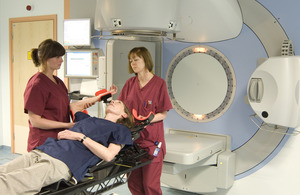World’s largest cancer database launched by PHE
The world's largest single database of cancer patients is being set up by Public Health England in a major step forward to harnessing the power of data to revolutionise care.

Radiation treatment for cancer
This new service, announced today at PHE’s National Cancer Intelligence Network ‘Cancer Outcomes’ Conference, will deliver near real-time cancer data and contain detailed clinical information on all 350,000 cancers diagnosed each year across the 50 million people in England. It will also include more than 11 million historical cancer records going back 30 years.
This single cancer registry follows the completion of a five-year project to merge the eight cancer registries in England into a centrally managed network of registry offices working to common standards and processes. This network is now overseen by PHE.
For the first time cancer specialists across the country will have instant access to detailed clinical data, including the way tumours respond to different types of treatment, which will speed up work to deliver personalised cancer medicine to patients in the future.
It will eventually track how each sub-type of cancer responds to treatment, helping doctors target genetic mutations with a new generation of drugs designed to work most effectively on relatively small numbers of patients.
Jem Rashbass, national director of disease registration at PHE, said:
The real advances of personalised medicine can only be achieved if we can match the data we have from genome sequencing with very rich clinical data on each patient.
Cancer-registry modernisation in England is about to deliver the most comprehensive, detailed and rich clinical dataset on cancer patients anywhere in the world.
This is game changing. It will fundamentally revolutionise the way we diagnose and treat cancer. In effect, every cancer patient has a rare disease that is different in some way from another cancer. This allows us to carry out refined searches to see how other tumours have responded to identify the optimum treatment as early as possible. The hope is that in five years we’ll be sequencing cancers and using therapies targeted to it.
This resource is unmatched anywhere else in the world, but is essential if we are to deliver the best cancer treatment and care to each individual. The value can only be achieved with the full support of the public who we are here to serve.
The system is set to provide a near real-time collection system that receives monthly data from every acute NHS trust. This includes histopathology reports, multidisciplinary team meeting decisions, radiotherapy and chemotherapy treatment data, administrative details such as route of admission and access to imaging information which will enable accurate cancer staging.